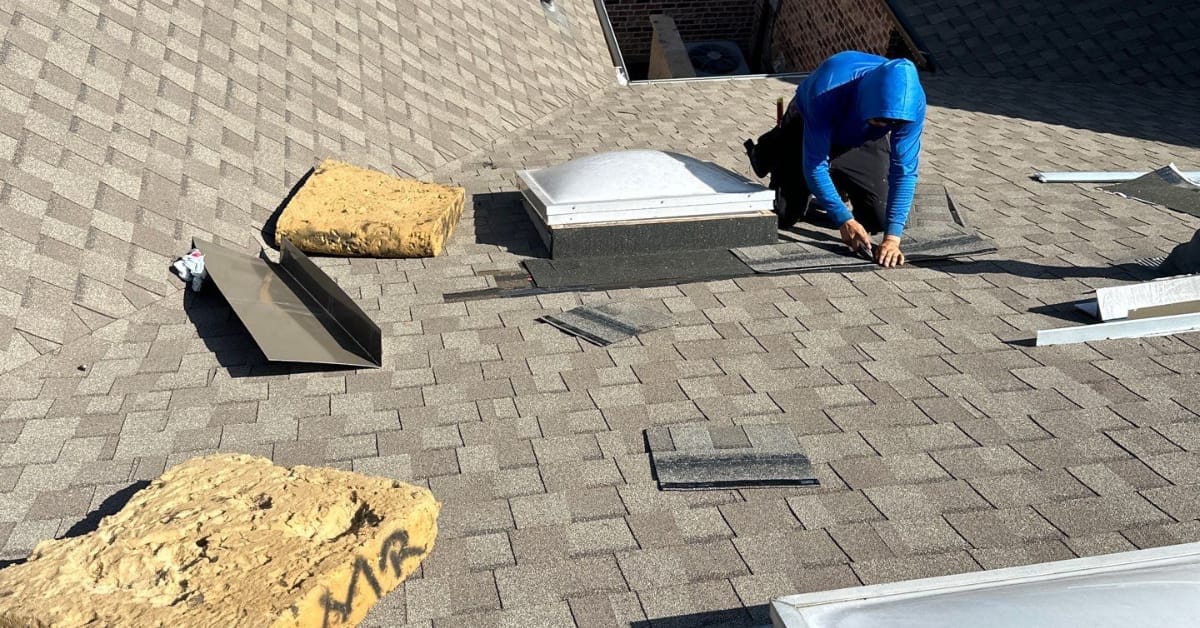-
In Texas, general contractors and roofers don’t need a license. That makes it easy for unqualified crews to take on work they aren’t trained to do.
-
This can lead to cut corners, missing materials, skipped waterproofing—you name it. All of this could have been avoided with better screening upfront.
-
That’s why homeowners should ask for paperwork, verify references, and walk away from vague bids or pressure tactics.
In Texas, contractors don’t need a license to work on your home. That means the burden falls on the homeowner to separate real professionals from crews that won’t do the job right. That’s no small thing. We’ve worked on dozens of homes that weren’t damaged by storms but by bad work. While this shouldn’t be the homeowner’s responsibility, most of those regrettable jobs could have been avoided if the contractors were more thoroughly vetted.
That’s what we’ll talk about in this article: What you should do before a hire, and when your best move is to walk away. For a deeper look at Texas’ unregulated roofing market, you can also read our article on insurance fraud or the illegal waiving of deductibles.
Don’t Settle for a Vague or Cheap Bid
If a contractor gives you a number that’s too good to be true, it probably is. Pricing will always have a bit of variance, but after getting multiple offers for a roofing job, they should all be in the same ballpark. If one is significantly lower, and if that bidder can’t clearly explain what the estimate includes, then it’s a red flag.
An estimate isn’t just a gut feeling or an unsubstantiated number. A proper estimate should list out what’s being done, what materials are being used, and when each phase will be completed. So, check the estimate. If you don’t see details, payment terms, or material specs, it’s more like a gamble. This indicates that shortcuts may be taken, cheap materials may be used, and unqualified people may be hired to keep as much money as possible.
That’s why the Texas Attorney General recommends getting multiple bids and making sure everything is in writing, including costs, scope, and schedule:
“The best policy is to get bids from more than one person for any work you are going to have done on your house. Get the bids in writing, and look for detail about exactly what will be done… Beware of the “low-ball” bidder whose price is much lower than everyone else’s.” (Source)
Get it In Writing: Contracts, Insurance, and Guarantees
If a contractor insists on cash, refuses to write anything down, or won’t send you a receipt, it’s time to walk away. Don’t feel pressured because they seem like the “professional.” Since Texas doesn’t require builders or roofers to carry a license, paperwork is even more important than usual. You need a signed contract, proof of insurance, and a clear payment schedule. A professional will have no problem presenting these to you.
The Texas Department of Insurance (TDI) has a very well-considered list of items you should ask a contractor before a build or repair is conducted. (Source) This includes asking for a Certificate of Compliance, which acts as, the TDI states, “proof of eligibility for wind and hail insurance coverage through the State’s catastrophe pool, the Texas Windstorm Insurance Association (TWIA).”
Secondary water barriers, Class 4 impact-resistant materials, sufficiently braced gable ends, and more are also featured on the list. An experienced contractor will understand the importance of these details and provide a thorough answer.
Look at Their Past Work, Not Just Their Website
Before hiring anyone, ask for references. If they’ve been in business for years and have done good work, this won’t be a problem. You can also check online reviews left in places other than the contractor’s website. For instance, you might find information in Google’s official business reviews, Facebook groups, or online forums. If there’s no evidence of past work, there’s no reason to trust them with your build or repair.
If the contractor dodges these questions or gives you shifting answers, don’t expect the job to go well. Without accountability, people can get away with some pretty shocking things. We know one client who paid for a full roof replacement, but only the first-floor section was done. From the ground, it looked fine. But during a home sale inspection, they found out the second story still had old shingles. Getting proper references, documentation, and inspections can help homeowners avoid these kinds of scams.
We’re Here to Help
Need more information? If you have any questions or need assistance with damage, contact DFW Roofers at (469) 751-4018 or schedule an appointment through our online appointment form.


